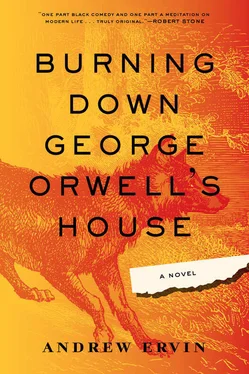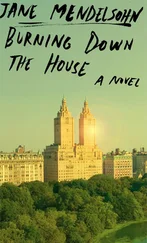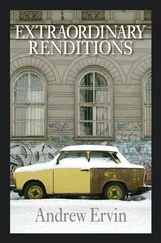His boredom had morphed from a meditative state to an emotional liability. He belched up a cloud of single-malt scotch, ate a few crackers from a tin, and put some clothes on. Ray needed to get out of the house again before he hurt himself. The blue jeans and sweater felt cumbersome after so much time spent in sweatpants. He no longer wondered if it was raining or not — the rain was a constant, a given. It wasn’t even rain any longer, but something immutable and permanent. Something inestimable. The atmosphere of the Inner Hebrides was made not for him but for the sheep and colorful lichens that sprouted from every surface.
The plan for the day was to walk to the source of Loch Tarbert, about halfway down the length of the island. From the map, hiking there looked doable in a few hours. Every place was in walking distance if one had enough time.
He left without locking the door, went a mile, maybe two, before he couldn’t ignore the pain in his feet any longer. His boots proved to be useless. No, they were worse than useless — they were harmful. The extent of their utility was to cause pain. After so many miles the leather remained as stiff and unforgiving as the day he bought them. Every step sent waves of battery acid splashing into the blisters on his heels and soles. Each puddle he stepped in — and the path was nothing if not one long puddle — found its way to his bloody socks. He tried to distract himself from the pain tingling up to his knees, to enjoy the scenery and the fresh air, but there were several agonizing miles to go before he reached the road.
He stopped to watch a fleet of dolphins skipping across the surface of the sound. There were said to be seals nearby too, and puffins over on the far side of Islay. He would need to find a better way to get around. All this walking sucked, but he kept going. The blisters felt like hateful marshmallows stuck in his socks. The pain became disorienting. It was inconceivable that such small wounds could inflict so much suffering. He spotted a cylindrical tower at the top of a hill — a bunker of some sort — and decided to stop there to assess the state of his feet. Even the slight incline caused his Achilles heels to rub harder against the backs of the boots. Up close, the structure resembled a standing stone made of concrete, manmade but more monolithic than Neolithic. It could have been an elaborate marker for a barrow of some sort, but that seemed unlikely. The object served no purpose that he could see — it just was . He sat against it and removed his boots to squeeze the water from his socks. It wasn’t so terribly cold out; he could walk home barefoot. Whatever it took to avoid putting those boots back on. He tied the laces together to make them easier to carry.
If by some miracle the rains stopped and clouds parted, this spot would have granted a great view of the entire island, but, as usual, Ray had to imagine all that the mists concealed. To the south, Loch Tarbert divided the land in half and, beyond that, the Paps loomed over everything around them. A few long, blistered miles west toward Colonsay would put him on the seaboard. That part of Jura, north of the lake, remained uninhabited and untamed. The coastal cliffs on the western shore were said to be home to a series of caves that he wanted to explore; over the years, they had been occupied by pirates, gypsies, even bootleggers who were said to have produced Jura’s first whisky, which they shipped to prohibition-era America.
The attraction of living on a small island — which was not so small after all, as both Farkas and his own feet attested — was the belief, mistaken to be sure, that he might get to know it in its entirety, that there existed one place on the planet that he could fully understand. So far, however, he had seen so little and what he had seen made him want to see and learn more. The natural world was inexhaustible and at the moment he faced the impossible decision of where to go next. He could pick any direction, but the number of choices terrified him. Maybe there was such a thing as too much freedom. Every decision, big or small, eliminated as many possibilities as it opened up. He could go anywhere. Or he could make his way back to Barnhill and stay indoors to drink himself senseless. It was a tough call, but he preferred the disappointment and self-hatred he would feel after another solitary bender in the sitting room over the fiery ache in his feet. He had made it as far as he could and hadn’t reached the public road, much less Loch Tarbert. The water mocked him in the distance. Hiking to the Paps would be unthinkable. The day was an abject failure. His life was an abject failure. He never should have come to Jura.
The rocks and sticks jabbed at his bare feet, just as they had so long ago back on his parents’ farm. He was going to pull his boots back on when the headlights of a truck came bouncing up the path from Craighouse. If it was Pitcairn, Ray planned to ignore him. Let him drive right by. Anyone else, he would flag him down and beg — down on his knees in the mud like an animal if he had to — for a ride back to Barnhill.
Then he heard it. The sound of the vehicle was unmistakable. That roar. That 6.2 liter V8 engine that combusted petroleum by the barrel and farted climate-changing gases. It couldn’t be. The truck was still far away, but he made out a few scratches in the paint: O … I … L … H …
Ray wiped the rain and sweat from his eyes. When he looked again, the SUV had become a small 4x4 pickup that was getting thrown back and forth by the potholes and puddles. It was the little white truck he heard go past the house from time to time. The revving engine sounded seasick. It stopped and a window rolled down. The driver was a burly man in his fifties. His woolly, fisherman’s sweater matched the color and texture of his beard. “Barefoot, is it? You’ll be wanting a pair of wellies from Mrs. Bennett.”
“I had no idea my feet could hurt this much,” Ray said. “Good to meet you, I’m—”
“I know who you are. You’ll be wanting to sit in the back.”
The passenger seat was empty. The cabin looked so warm, but the driver motioned for Ray to climb into the truck bed. He walked around the side of the vehicle and saw that three inches of black mud lined the back. It squeezed between his toes. The truck started moving again and he had to crouch and hold on to the side to balance. That was when he smelled it. He was squatting in a truckload of fresh fertilizer. The morning’s scotch clawed up the back of his throat. Pig shit coated his feet and his clothes and all Ray could do was laugh. When the truck stopped at Barnhill he was still cracking up.
He hopped out and went to invite his savior in for a wee dram, if only to postpone his own boredom a few more minutes, but the man drove off without as much as a wave. Ray waited for him to get out of sight, then stripped off all his clothes and allowed the rain to wash the shit off and then shoveled the new animal corpse into the overgrowth.
It took no time at all to get a fire raging. Ray’s pyromaniacal skills had improved in a short amount of time. For the evening’s scotch he chose a lovely ten-year-old the color of blond wood that had very recently sang bass in his rendition of Beethoven. He poured a short dram and inhaled the fumes deep into his nose. If shoe polish could smell delectable, that’s what the ten-year-old smelled like. Shoe polish and salt water. The first sip felt soothing in his chest, the second in his shoulders. The afternoon faded to evening.
He was skimming through “Such, Such Were the Joys,” a typescript of which Orwell had mailed to his publisher from Jura around the time he began Nineteen Eighty-Four , when he came to an insight about his own condition. In that essay, Orwell had written about his days at boarding school, where the entire hierarchy of the English class system got distilled to its cruelest possible concentration. The American corporate world now operated in a similar manner.
Читать дальше












